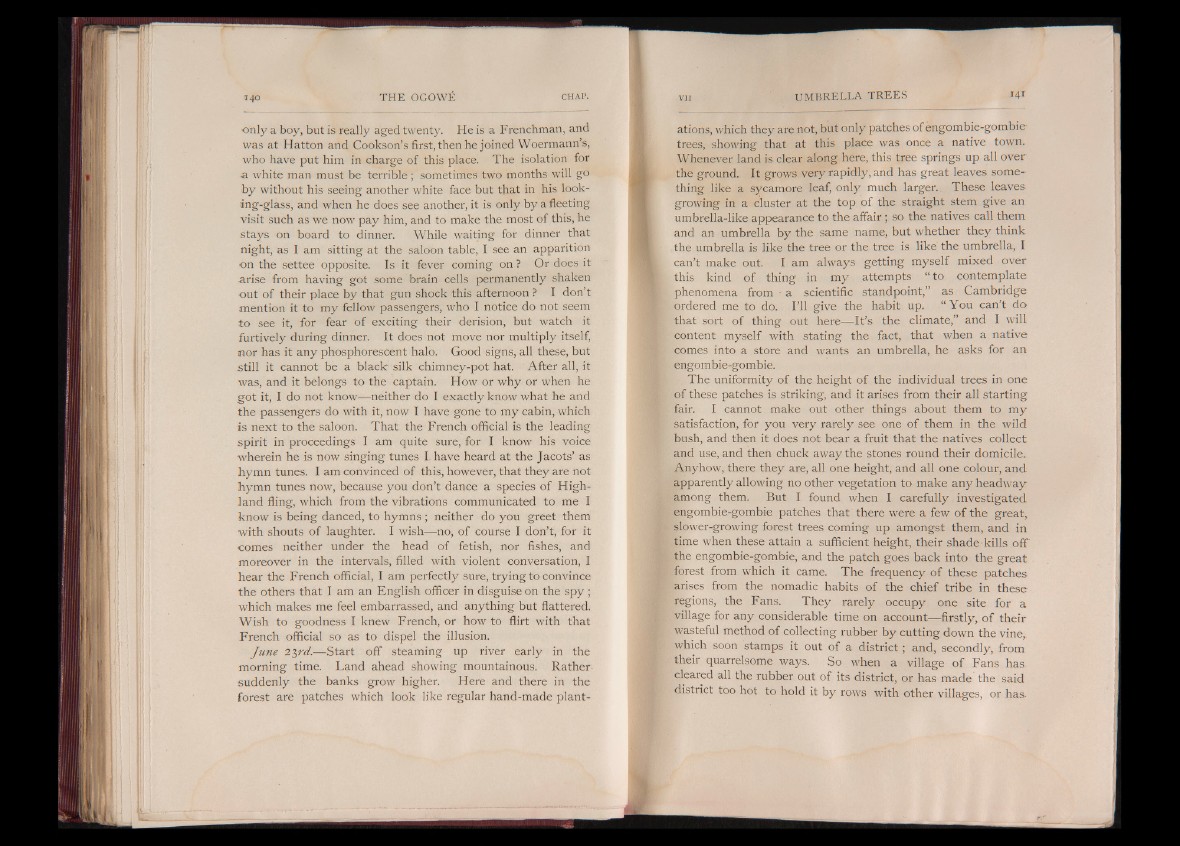
only a boy, but is really aged twenty. He is a Frenchman, and
was at Hatton and Cookson’s first, then he joined Woermann’s,
who have put him in charge of this place. The isolation for
■a white man must be terrible ; sometimes two months will go
by without his seeing another white face but that in his looking
glass, and when he does see another, it is only by a fleeting
visit such as we now pay him, and to make the most of this, he
stays on board to dinner. While waiting for dinner that
night, as I am sitting at the saloon table, I see an apparition
on the settee opposite. Is it fever coming on ? Or does it
arise from having got some brain cells permanently shaken
out of their place by that gun shock this afternoon ? I don’t
mention it to my fellow passengers, who I notice do not seem
to see it, for fear of exciting their derision, but watch it
furtively during dinner. It does not move nor multiply itself,
nor has it any phosphorescent halo. Good signs, all these, but
still it cannot be a black: silk chimney-pot hat. After all, it
was, and it belongs to the captain. How or why or when he
got it, I do not know— neither do I exactly know what he and
the passengers do with it, now I have gone to my cabin, which
is next to the saloon. That the French official is the leading
spirit in proceedings I am quite sure, for I know his voice
wherein he is now singing tunes L have heard at the Jacots’ as
hymn tunes. I am convinced of this, however, that they are not
hymn tunes now, because you don’t dance a species of Highland
fling, which from the vibrations communicated to me I
know is being danced, to hymns ; neither do you greet them
Avith shouts of laughter. I wish— no, of course I don’t, for it
comes neither under the head of fetish, nor fishes, and
moreover in the intervals, filled with violent conversation, I
hear the French official, I am perfectly sure, trying to convince
the others that I am an English officer in disguise on the sp y ;
which makes me feel embarrassed, and anything but flattered.
Wish to goodness I knew French, or how to flirt with that
French official so as to dispel the illusion.
June 23rd.— Start off steaming up river early in the
morning time. Land ahead showing mountainous. Rather-
suddenly the banks grow higher. Here and there in the
forest are patches which look like regular hand-made plantations,
which they are not, but only patches of engombie-gombie
trees, showing that at this place was once a native town.
Whenever land is clear along here, this tree springs up all over
the ground. It grows very rapidly, and has great leaves something
like a sycamore leaf, only much larger.. These leaven
growing in a cluster at the top of the straight stem give an
umbrella-like appearance to the affair ; so the natives call them
and an umbrella by the same name, but whether they think
the umbrella is like the tree or the tree is like the umbrella, I
can’t make out. I am always getting myself mixed over
this kind of thing in my attempts “ to contemplate
phenomena from • a scientific standpoint,” as Cambridge
ordered me to do. I’ll give the habit up. “ You can’t do
that sort of thing out here— It’s the climate,” and I will
content myself with stating the fact, that when a native
comes into a store and wants an umbrella, he asks for an
engombie-gombie.
The uniformity of the height of the individual trees in one
of these patches is striking, and it arises from their all starting
fair. I cannot make out other things about them to my
satisfaction, for you very rarely see one of them in the wild
bush, and then it does not bear a fruit that the natives collect
and use, and then chuck away the stones round their domicile.
Anyhow, there they are, all one height, and all one colour, and.
apparently allowing no other vegetation to make any headway
among them. But I found when I carefully investigated
engombie-gombie patches that there were a few of the great,
slower-growing forest trees coming up amongst them, and in
time when these attain a sufficient height, their shade kills o ff
the engombie-gombie, and the patch goes back into the great
forest from which it came. The frequency of these patches,
arises from the nomadic habits of the chief tribe in these
regions, the Fans. They rarely occupy one site for a
village for any considerable time on account— firstly, of their
wasteful method of collecting rubber by cutting down the vine,
which soon stamps it out of a district; and, secondly, from
their quarrelsome ways. So rvhen a village of Fans has
cleared all the rubber out of its district, or has made the said
district too hot to hold it by t o w s with other villages, or has.